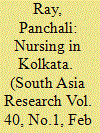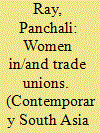| Srl | Item |
| 1 |
ID:
170671


|
|
|
|
|
| Summary/Abstract |
Research on ‘care work’ tends to focus on relations between gender and ‘care’ at the cost of obfuscating caste and class markings that devalue such labour. This article argues that the service work of the contemporary nursing profession, as observed in Kolkata, continues to be devalued, not because it is care work but because it is linked to low-caste/out-caste women who have historically provided nursing care. To counter such stigma, nursing has witnessed a splintering along the lines of ‘prestigious’ and ‘dirty’ work. This cleavage, based on historically and socially produced structural inequalities, is supported both by organisational strategies and a privileged section of workers, who deploy ‘merit’ or cultural capital to close ranks against others. The article examines how women located at the bottom of this hierarchy resist such strategies. What does ritual, banal everyday resistance imply for processes and practices that reproduce organisational inequalities?
|
|
|
|
|
|
|
|
|
|
|
|
|
|
|
|
| 2 |
ID:
170269


|
|
|
|
|
| Summary/Abstract |
This essay draws from an ethnographic study on nurses and attendants in the city of Kolkata to re-turn to the question of women’s consciousness and agency. I trace women’s reluctance to participate in union activities both to the failure of formal mechanisms of collective bargaining in representing workers’ interests, and to gendered norms that come in the way of organizing women workers. I explore how the performance of respectable femininity, legitimized by class and caste norms, inhibits women’s participation in intensely politicized masculine domains. Though at first glance it may seem that women’s reluctance to participate in union activities is gender neutral, I demonstrate that gender norms produce a social field that denies women political agency.
|
|
|
|
|
|
|
|
|
|
|
|
|
|
|
|